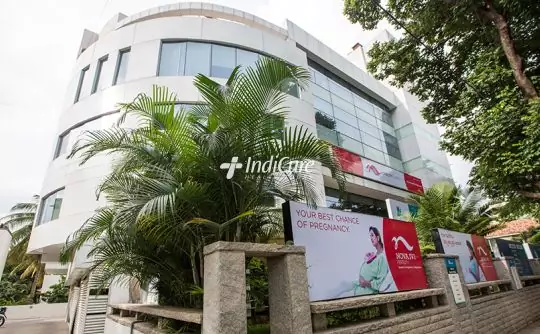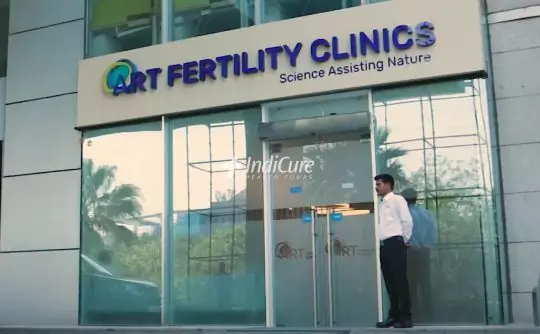

IVF cost in India starts from US $3,300 and varies depending on the medical history of the patient, the number and types of interventions required, the doctor, the choice of facility, and the city where you choose to get the treatment done.
The cost of IVF in India quoted above is indicative only and should not be taken as the final cost of the treatment. The final IVF cost in India can be ascertained after the specialist has evaluated the patient. The cost in Indian Rupees can vary based on the exchange rate.
While figuring out IVF cost in India, a significant expense to consider is the doctor's fee. IndiCure Health Tours facilitates connections with exceptionally skilled IVF specialists in India, renowned for their expertise and excellent track record of successful outcomes. Nevertheless, the IVF cost in India can fluctuate based on the doctor's experience and the treatment approach adopted.
If your IVF treatment in India requires egg or sperm donation, then there will be additional costs for your IVF treatment.
The procedure is a specialized technique that incurs an additional cost to your IVF treatment in India. During this process, an embryologist employs micromanipulation methods while working under a microscope to delicately create a small aperture in the zona pellucida, the outer layer of the embryo. This meticulous intervention is intended to potentially facilitate the embryo's implantation within the uterine lining.
ICSI is a procedure that helps in male-factor infertility issues. If this procedure is advised as part of your IVF treatment in India, then there will be additional costs for this. In this procedure, a single sperm is injected directly into a mature egg to help fertilization.
TESE procedure helps with male-factor infertility where no sperm is present in the patient's ejaculate. It is performed under local anaesthesia which allows sperm to be retrieved directly from the testicles. Although it is a minor procedure, there is an additional fee for this procedure. Post-treatment expenses may include medications and follow-up consultations.
Opting for an accredited surgical facility staffed by competent and proficient medical professionals is paramount for the optimal outcome of the IVF procedure. In India, metropolitan areas generally boast advanced medical establishments and seasoned surgeons, which can lead to increased expenses of IVF cost in India, but ensures safety and quality of care. IndiCure Health Tours emphasizes the selection of surgical facilities in major Indian cities, prioritizing excellence in healthcare delivery and guaranteeing patient well-being and safety.
At IndiCure, we consolidate most of the expenses for your IVF treatment in India to provide you with an inclusive and cost-effective package tailored to your budget and individual requirements. After receiving medical reports, your case manager will provide an estimated surgery cost based on a discussion with the IVF specialist. The final IVF cost in India can however be confirmed after your face-to-face consultation with the IVF specialist.

We Help you Choose the Right Treatment, Surgeon & Hospital

We Arrange Video/Telephonic Consultation with the Surgeon

We Assist you with Visa & Accommodation

We Receive you at the Airport and Drop you at Hotel/Hospital

We Assist you the at Hospital & Provide Post Operative Support
Years of Experience
Happy Clients
Countries Patient Treated
Most Affordable Price
Here is a set of questions you should consider asking before commencing your journey for IVF treatment in India.
In vitro fertilization (IVF) is the process of fertilizing a woman's egg with sperm in a laboratory under controlled conditions, resulting in the development of embryos. The embryos that result are allowed to mature for 3-5 days before being placed back into your uterus. For couples who are having difficulty conceiving naturally, IVF is the gold standard.
Infertility is a condition in which a woman is unable to become pregnant after one year of trying or six months if she is over 35. A woman must release an egg that must travel via the fallopian tube to reach the uterus to get pregnant. To fertilize the egg, the egg must first encounter a sperm in the uterus, and then the fertilized egg must connect to the inside of the uterus, a process known as implantation. If there is an issue with any of these phases during these events, sterility ensues.
Infertility can be caused by issues with either the male or the female, or both. A third of infertility issues are caused by male fertility issues, another third by female fertility issues, and the remaining one-third is caused by both male and female factors.
Fertility treatment is determined by a number of criteria, including the length of infertility, as well as the age of both the male and woman. In-vitro Fertilization is one of the most common treatment options (IVF).
Monitoring a woman's ovulatory process, extracting eggs from her ovaries, and allowing sperm to fertilize the ova in a fluid medium in a laboratory are all elements of the IVF method. The zygote that forms inside the fluid medium is subsequently transferred to the uterus to start a pregnancy.
Summarizing, the various steps of IVF surgery include:
In-vitro fertilization can help couples overcome various types of infertility. Suitable candidates for IVF are those who have:
You should also be in good health to be a good candidate for IVF because you must be able to carry a pregnancy once it is established.
Long Protocol - Down regulation or Suppression of Pituitary Ovarian Axis: There is suppression of the pituitary ovarian axis by prolonged use of hormone - GnRH agonist. Following downregulation of the pituitary ovarian axis, the ovaries are hyperstimulated using Follicle follicle-stimulating hormone or FSH after 10 to 14 days. The IVF cycle using this method is known as conventional IVF.
Short Protocol: This part skips the downregulation and a regimen of fertility medications is given to the woman to stimulate the development of multiple follicles of ovaries. Injectable gonadotropins and FSH analogs are given under close monitoring.
Egg Retrieval
When the oocytes have reached optimal maturity, they are carefully collected using ultrasound-guided needles. Typically, between 8 to 15 eggs are retrieved in a single session. Following the retrieval procedure, the woman is then taken to the recovery room, where she can rest and recuperate comfortably.
Sperm Collection
It is generally a straightforward procedure. However, in cases where a man is unable to ejaculate semen naturally, surgical methods may be employed to retrieve the sperm. This surgical intervention ensures that the necessary sperm are obtained for use in the fertility treatment process, thereby overcoming any potential obstacles to conception.
Fertilization
This process initiates once both the eggs and semen have been collected, proceeding to the laboratory for the induction of fertilization. In cases where a single sperm is injected directly into an egg, this method is termed Intracytoplasmic Sperm Injection (ICSI). Subsequent to fertilization, the embryos undergo incubation for several days to facilitate their development.
Transfer of Embryos
The physician assesses the embryos, selecting two to four of the most viable ones for implantation into the woman's uterus. This transfer process involves guiding the embryos through the cervix and into the uterus using a catheter.
The success rate of IVF worldwide ranges from 20 - 60 % per IVF cycle. However, it is important to note that this in no way can determine how successful your IVF can be.
Besides, talking about IVF success rates can be deceptive, since they do not account for the various factors that can impact the result of IVF in different patients. Therefore, you must ask your IVF doctor about the odds of success in your individual situation rather than relying on overall success percentages.
Few of the factors that affect IVF success rate are:
Besides above, timing of the entire IVF procedure, reasons of infertility, the doctor's experience and expertise being other important factors.

Mumbai
Nova IVF Fertility (NIF) is a fertility clinic that offers the most modern & cutting-edge fertility treatments. Over the last eight years, they have grown to over 40 centers, achieving over 40,000 pregnancies. NIF offers three fertility clinics in Mumbai, one in Andheri, the other in Chembur, and the third in Vashi.

Gurgaon
ART Fertility Clinics, Gurgaon, has already established itself as a premier single-specialty facility for assisted reproductive technology since its inception in 2021. The hospital is operated by ESHRE-certified fertility doctors and adheres to WHO guidelines.
Women in their 20s and early 30s have the best success rates with IVF. Once you approach mid-thirties, chances of success start to dwindle. Age is a more critical determinant for IVF success than FSH levels, according to a fertility study published in 2003 in Fertility and Sterility, and increasing mother age correlates with a lower implantation and pregnancy success rate.
IVF after the age of 40 has a decreased success rate since both egg quantity and quality have often declined by that time. As a result, many fertility clinics set an age limit for IVF treatment. This age limit varies in every clinic, however it is often around 50 years old.
"What if my IVF fails?" most patients wonder. This is a possibility that should be considered because IVF pregnancy is not assured, and success rates in IVF are actually quite low. If this occurs, there are a number of options to consider:
Attempt more IVF rounds
There could be a number of different reasons for IVF failure, and if your doctor can pinpoint one in your instance, it may be addressed in subsequent cycles. Preimplantation genetic testing (PGS) has been shown to improve IVF success, therefore it may be a viable alternative in future cycles.
Using Donor Eggs
In most situations, poor egg quality is the main cause of IVF failure; better eggs from a donor may be recommended, especially if you are over 35 years of age.
Surrogacy
Some couples believe they are unable to undergo the IVF process time and again since it puts the mother's health at risk. You can consider using a surrogate if your IVF failed due to implantation failure. Please note that Surrogacy is not legal in India, so you cannot exercise that option in India.
Adoption
This is an extremely personal decision, but it's worth thinking if your doctor says your chances of getting pregnant are slim. If numerous cycles have failed, you may want to explore this since the mental and financial strain can be too much to bear.
While transferring more than one embryo increases the chances of a successful IVF pregnancy, it also increases the risk of a multiple pregnancy. Multiple pregnancies come with a slew of added problems.
The primary goal of IVF treatment is to give you a single, healthy child.
However, each case is unique, and your doctors will consider the risks and benefits of repeated embryo transfer based on your age and health.
Older women may benefit from transferring two embryos rather than one, according to research, because the benefits exceed the dangers. Discuss with your doctor how many embryos to transfer in your IVF cycle based on your specific circumstances.
You have given multiple options for the leftover embryos:
Preserving for future Use:
If you think you'll want to have more kids in the future but aren't sure if infertility will again be an issue, you can freeze your embryos and use them later.
Donation of an embryo
You could choose to give your embryos to another couple who is having trouble conceiving. This is a very personal decision, and it's crucial to think it over well first.
Embryos can be donated to medical research.
Not only may embryos be used to better understand and improve reproductive treatments, but they can also be utilized to better study genetic diseases. This could be extremely beneficial to medical research and treatment.
Embryos to be discarded
Again, this is a decision that should be carefully considered, but if you desire, your reproductive clinic can arrange for proper disposal of any remaining embryos.
IVF demands a significant time and financial commitment; it has an impact on your physical health and may result in emotional turmoil. Before choosing to undertake IVF, it is critical that you learn as much as possible about the treatment.
Apart from the IVF cost in India, there are additional expenses to consider when planning your trip. This includes budgeting for meals, airfare costs which will vary depending on your location of origin and the time of booking, and ground transportation expenses, such as taxi fares or rental car costs. Lastly, accommodation costs during your recovery period are crucial to consider, whether you opt for a hotel near the medical facility or other lodging options that suit your preferences and budget.
By carefully considering these additional expenses alongside the IVF cost in India, you can better plan and budget for your trip to India, ensuring a smooth and comfortable experience during your recovery process.
The IVF cost in India is significantly lower compared to Western countries. This can be attributed to various factors, including the overall lower cost of living in India and a favorable exchange rate for international patients.
In India, the expenses associated with medical procedures, including IUI and IVF tend to be more affordable due to the lower cost of healthcare services and resources. Additionally, the exchange rate for international currencies, when converted to Indian Rupees (INR), often provides a favorable advantage for patients traveling from abroad seeking medical treatment.
As a result, many patients from around the world opt to travel to India for IUI treatment and other medical procedures, taking advantage of the cost savings without compromising on the quality of care received.
Enhance your medical journey to India by availing these extra services.
Traveling abroad for medical reasons may be challenging. With our experience of over a decade and working with the best surgeons and top hospitals in India, we help make your medical tour easier and safer for you. We will guide you at every step of the way and make end-to-end arrangements for your surgery, travel, and stay.
Ramandeep Dhaliwal
I had great experience having rhinoplasty through Indicure. Dr. Ruchika from Indicure has helped me in finding best plastic surgeon, answering all my questions...
Read More
Joshua Archer
My name is Joshua Archer I'm from New Zealand, bay of plenty, kawerau I opted for the bypass surgery in January 2023 but planned it in advance for 28 September found IndiCure...
Read More
Kera Ren
Absolutely loved my experience with IndiCure - from first inquiring to meeting the surgeon pre op to my follow up post op. The surgeon was extremely approachable...
Read More
Andreana Paul
Had a wonderful experience. Visited India for my plastic surgery. From sending mails, airport pickup, comfortable accommodation and, to smooth hospital appointment booking...
Read More
Brandi Luce
I had the privilege of using Indicure's services for a cosmetic procedure that I had wanted for a long time but had always been apprehensive about. Ruchika helped me...
Read More
Jade M
Indicure Health Tours went above and beyond my expectations. They helped me with every aspect of my journey and were professional, kind and caring. I was...
Read More
The content on the website (www.indicure.com) is intended to be general information and is provided only as a service. All photographs on our website of before and after results are examples only, and do not constitute an implied or any other kind of certainty for the result of surgery.
Learn about IndiCure Health Tours' comprehensive editorial policy that strives to deliver trustworthy, helpful, relevant, accurate and people-first content on medical tourism in India.
It is not medical advice and should not be taken as medical advice. It should not be used to diagnose or treat a health condition and is in no way meant to be a substitute for professional medical care. You are advised to see a surgeon in person to assess what surgery may or may not accomplish for you.
It is also important to keep your expectations realistic and to understand that all surgical procedures carry risks and should never be taken lightly.